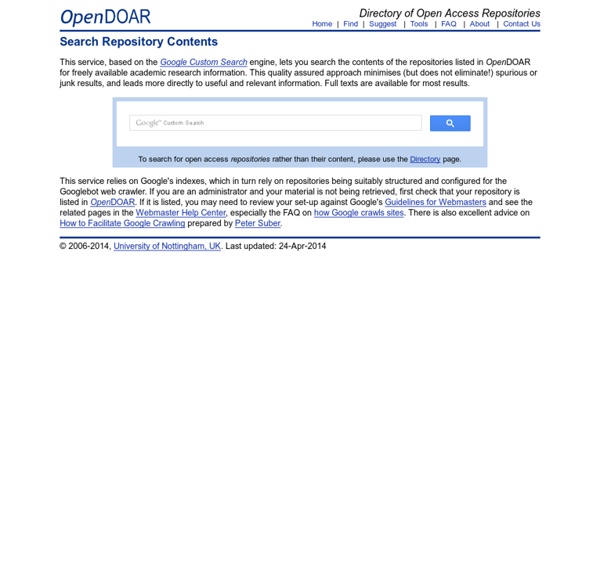



http://www.opendoar.org/search.php
Lucene - Overview - Apache Lucene Apache LuceneTM is a high-performance, full-featured text search engine library written entirely in Java. It is a technology suitable for nearly any application that requires full-text search, especially cross-platform. Apache Lucene is an open source project available for free download. Please use the links on the right to access Lucene. Lucene offers powerful features through a simple API: Find - Directory of Open Access Repositories Search or Browse for Repositories <intR>²Dok "Ergani - Historical Archive of Aegean" Repository Web Science and Digital Libraries Research Group: 2015-07-07: WADL 2015 Trip Report It was the last day of the ACM/IEEE-CS Joint Conference on Digital Libraries (JCDL) 2015 when the Workshop on Web Archiving and Digital Libraries (WADL) 2015 was scheduled and it started on time. When I entered in the workshop room, I realized we needed a couple of more chairs to accommodate all the participants, which was a good problem to have. The session started with a brief informal introduction of individual participants. Without wasting any time, the lightning talks session was started.
List of academic databases and search engines - Wikipedia Wikipedia list article This page contains a representative list of notable databases and search engines useful in an academic setting for finding and accessing articles in academic journals, institutional repositories, archives, or other collections of scientific and other articles. Databases and search engines differ substantially in terms of coverage and retrieval qualities.[1] Users need to account for qualities and limitations of databases and search engines, especially those searching systematically for records such as in systematic reviews or meta-analyses.[2] As the distinction between a database and a search engine is unclear for these complex document retrieval systems, see:
Materials Science and Engineering Structure-Property Relationships Of Polyisobutylene-Block-Polyamide Thermoplastic Elastomers, Morgan Dunn Heskett 2016 University of Southern Mississippi Structure-Property Relationships Of Polyisobutylene-Block-Polyamide Thermoplastic Elastomers, Morgan Dunn Heskett UK Web Archives Forum @ BBC Broadcasting House Friday 19th June saw the first UK Web Archives Forum at Broadcasting House. This was set-up by BBC Archives as an opportunity to get the British Library, the National Archives and Channel 4 together with BBC Archives to discuss current archiving policies & practice in the ever shifting world of web & social media archiving. Representatives from the aforementioned institutions were present including the BBC's own Web Archives team. The session was very well received, and everyone involved came away with lots of new ideas and potential future collaborations.
BASE - Bielefeld Academic Search Engine BASE is one of the world's most voluminous search engines especially for academic web resources. BASE provides more than 200 million documents from more than 8,000 content providers. You can access the full texts of about 60% of the indexed documents for free (Open Access). BASE is operated by Bielefeld University Library. We are indexing the metadata of all kinds of academically relevant resources – journals, institutional repositories, digital collections etc. – which provide an OAI interface and use OAI-PMH for providing their contents (see our Golden Rules for Repository Managers).
Works Skip to main content ScholarWorks@UMass Amherst Part of the Materials Science and Engineering Commons Works in Materials Science and Engineering Molecular Engineering Strategies for the Design and Synthesis of New Organic Photovoltaic Materials, Paul J. The Signal: Digital Preservation This is a guest post from Elizabeth England, National Digital Stewardship Resident, and Eric Hanson, Digital Content Metadata Specialist, at Johns Hopkins University. Elizabeth: In my National Digital Stewardship Residency at Johns Hopkins University’s Sheridan Libraries, I am responsible for a digital preservation project addressing a large backlog (about 50 terabytes) of photographs documenting the university’s born-digital visual history. Since 2004, the campus photography unit, Homewood Photography, has used an exclusively digital workflow and the photographs have been stored on optical media. Before I arrived, the Ferdinand Hamburger University Archives had already taken physical custody of thousands of these DVDs, but needed someone who could be devoted to processing this large-scale collection. All this to say, this collection is being processed at a more granular level than may be expected given its size.
Home - US IB Extended Essay - LibGuides at American School of Madrid Academic honesty in the IB educational context Most students understand that it is wrong to copy another student's work and submit as their own. However, it is also dishonest to copy and paste text from WWW into your paper and submit as your own writing or ideas. Academic Honesty The Plagiarism.org website provides some helpful information on intentional and unintentional plagiarism, and on how students can avoid plagiarism by good citation. Paraphrasing can be difficult, and the Indiana University Writing Tutorial Services provides some helpful information on how to properly paraphrase. Texas Digital Library What if libraries and universities could bypass the high costs of print journals by providing less costly outlets for scholarly work? What if any faculty member with the willingness to do the work could start up his or her own peer-reviewed journal without prohibitive start-up costs? What if scholarship were available to the many instead of the few? With TDL Electronic Journals, faculty members, libraries, and universities can produce refereed, open-access scholarly journals, ensuring the availability of important scholarship to researchers across the world.
Search Contents of Open Access Repositories by sirchamallow Sep 6